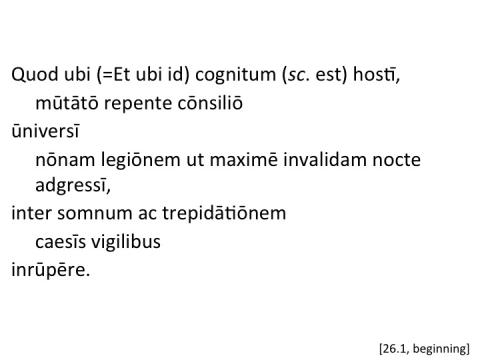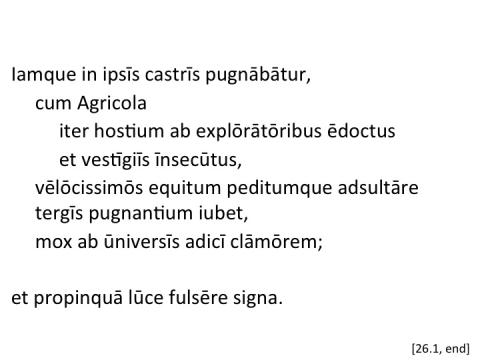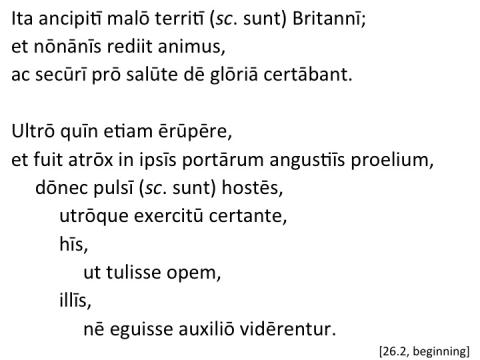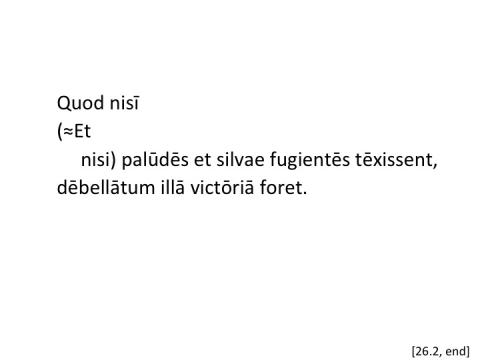Overview: The enemy in full force fall on the Ninth Legion by night; Agricola hastens to the rescue and the foe is repulsed. (Stuart); this chapter begins on f. 59v of the codex Aesinas.
26.1
quod ubi cognitum = et ubi id cognitum est. (Damon)
ūniversī: having combined the several columns mentioned above. (Stuart)
nōnam legiōnem ... invalidam: this peculiarly ill-starred legion had been well-nigh annihilated in 60 CE in the uprising headed by Boudicca, but the losses then incurred had been made good by new levies from Germany. The weakness referred to may have been due to subsequent misfortunes or may have been caused by the detachment of some of its cohorts for duty in Germany. (Stuart) invalidam: perhaps because it had not been made up to its full strength after its disaster in Boudicca's rising. (Pearce)
inter somnum ac trepidātiōnem: join with inrūpēre. (Stuart) trepidātiōnem: adds detail to somnum. (Pearce) inter ... inrūpēre: i.e. after killing the sentries they burst in right among the sleeping soldiers, thus creating a panic. inter = "in the midst, during," so frequently. ac is epexegetic. See Introd. p. xxx, #18. (Gudeman) inrūpēre: sc. castra. The absolute use is exceedingly common in Tacitus, but in the minor works only here and ch. 25.4. (Gudeman)
iter ... ēdoctus: verbs of teaching take two direct objects. (Pearce) [A&G 396]
vestīgiīs: “on their track.” Ablative of 'road by which' one goes. (Pearce) [A&G 429a]
adsultāre tergīs: graphic expression for a rear attack. Tacitus's liking for novel expressions is especially apparent in military and technical parlance. (Stuart)
clāmōrem; et ... signa: observe the force of et: “and then.” See Introd. p. xxviii, #14. (Gudeman) clāmōrem: to alarm the Britons and to apprise the besieged of the arrival of relief. (Stuart)
lūce: “daybreak.” (Pearce)
signa: “the standards of the relieving force.” (Pearce); the heavy-armed infantry had proceeded more slowly to the scene of action. (Stuart)
26.2
territī: sc. sunt. (Damon) territī ... rediit ... certābant: a noteworthy shift in tenses; such changes are, however, possible in vivid description, such as the present context. (Stuart) secūrī prō salūte: prō depends on the idea of “fear” in the latter part of the word secūrī. (Pearce) prō = dē. (Stuart) secūrī prō: prō is here used because of a dē following after this. (Gudeman) certābant: "they began to fight." (Stuart); in Tacitus almost always with de. (Gudeman)
ultrō: see chapter 25.3. (Stuart)
quīn etiam: put out of place to give greater emphasis to ultro. (Pearce)
dōnec pulsī: sc. sunt. (Pearce)
utrōque exercitū: "each division of the Roman army." Exercitus is often used of a single legion. (Stuart); i.e. the relieving and the defending Roman armies. (Pearce)
quod nisi: see note on 16.2. (Pearce)
dēbellātum ... foret: see note on 24.3 dēbellārī ... Hiberniam. (Pearce)




